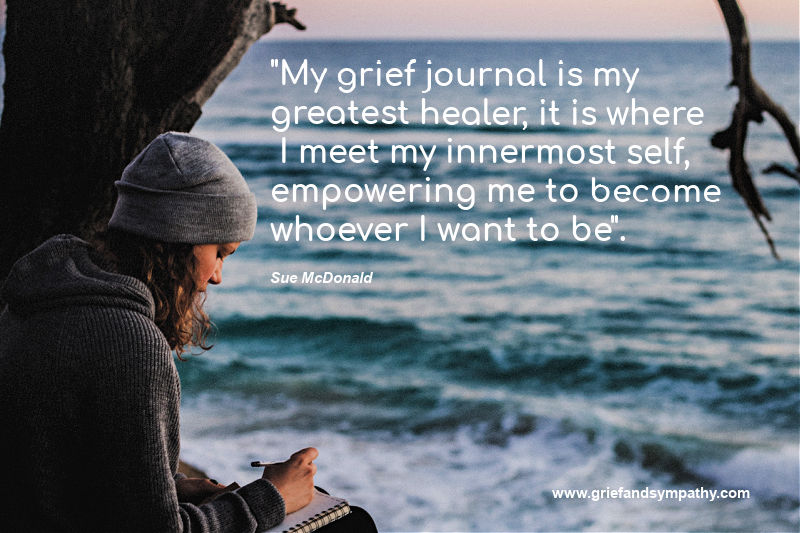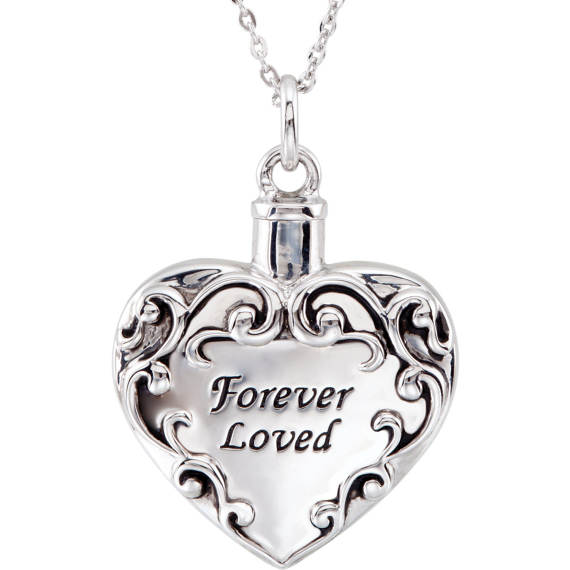What Is a Grief Journal?
By Sue McDonald, Grief Counselor and Grief Journal writer for over 20 years.
In essence, grief journaling is a vehicle to write or record your journey through grief. There is no right or wrong way, and each journal is unique to its author.

I do not want to provide a definitive answer, nor an instruction manual with a set of tasks to complete. This limits our creativity and individuality, crushing our free will, causing us to feel fear and shame, for ‘getting it wrong’.
I want to give you encouragement, to empower you, to guide you towards your own kind of grief journal, unique to you, with no set structure or pattern. Your grief journal can be anything you want it to be. There are NO RULES.
What Does A Grief Journal Look Like?
Use your imagination, and let your intuition guide you. Don’t worry about grammar, spelling or punctuation. Remember, NO RULES!
Here are a few ideas
- Simple exercise book or leather bound journal
- Home made book, or shop bought
- Lined or unlined
- Small or large
- Scrap book
- Black and white or colour
How Journaling Helps With Grief
Research suggests that there are many health benefits (physical, emotional and spiritual) to grief journaling. Just a few minutes of journaling each day can reduce stress, increase awareness, and enable us to process our emotions. Here are some of the ways grief journaling can help us:
- Connects us to our emotions
- Helps us to process emotions
- Calms our nervous system
- Slows down our thought process
- Makes meaning of our thoughts
- Bypasses our rational left brain, and engages our right, intuitive brain
- Lowers heart rate and reduces blood pressure
- Reduces anxiety and depression
- Declutters the mind
- Reduces stress
- Processes memories
- Increases self awareness
- Improves self discipline
- Helps us to achieve our goals
- Develops self confidence
- We can do this in our own time
- Connects us with our internal world
- It is non threatening and non judgmental
- Integrates parts of the self
- Helps to regulate emotions.
Bolton G, Gelipter D, Nelson P (2000) Keep taking the words: therapeutic writing in primary care. British Journal of General Practice. 50 (450) 80-81
Can Grief Journaling Be Harmful?
It is possible to become stuck in your thoughts. Difficult, painful emotions can surface. However, we can use our grief journal to explore these thoughts and painful feelings, to help us understand and process them safely. If necessary, we can seek external support from trusted friends, family or professionals.
My Journal Story
I began journaling as a requirement for my first counseling course many years ago, to explore my personal process and progress through my professional journey. Initially I felt confused, frustrated and rather fearful.
- What was I supposed to write?
- Who would see my writing?
- Was I doing it properly?
Early entries were simply lists and accounts of my daily activities, but, slowly, I learned to explore my thoughts and feelings, until journaling became an important part of my everyday life. Ultimately, my journal enabled me to break through into my deeply repressed grief, and helped me to process a myriad of emotions, too scary to speak out loud. Over many years, my grief journal has helped me to heal from complex, traumatic grief, and continues to be an integral part of me.
- My grief journal is my best friend, my therapist, my guide, my greatest teacher and my harshest critic. It is my safe space where I can rant and rage, explore, scream, laugh and cry, enabling me to express everything I think and feel without judgment.
- My journal is my portal to my inner world of dreams, fears and imagination, where I can visit whenever I want to, undisturbed and uncontaminated by anyone else.
- My journal is my very own personal, private place which belongs only to me. It has become my most important, precious possession, accompanying me wherever I go, ready and poised to listen and bear witness to my ongoing everyday life. A life like yours, filled with joy and sadness, fear and love, anger and hatred, jealousy and compassion, plus that dreaded emotion and arch enemy, shame.
- My journal is where I meet my self. Not the persona I present to the world, to conform with cultural ideals, patriarchal dogmas, and societal expectations, but my innermost self, unknown to all but me. It is an extension of me, a reflection of me, and a part of me, enabling and empowering me to become whoever I want to be, without the limiting constraints of other people’s helpful suggestions, and unhelpful criticisms.
- My journal is my saviour, my salvation from suffering, and my greatest healer. It is my safe container where I can pour my heart out onto each page knowing that whatever I say, it will be in complete confidence. It is a place to explore and express my thoughts, emotions and actions; to reflect and understand relationships, with others, and myself ; and a place to grow, develop, and process all I experience.
- My journal has become my sacred place to heal, restore, regenerate and celebrate as I continue my journey as a sentient human being, often struggling to find my way through this dynamic, amazing process called life.
I have experienced many ‘lightbulb’ moments through grief journaling.
- I discovered that my many physical symptoms were a result of repressed grief, which gradually dissolved as I worked through my pain.
- I have recovered memories (good and bad) which I had lost.
- Most importantly I have discovered my true identity, as the hidden parts of myself slowly emerged in my writing.
- Today, I have a new and authentic relationship with myself.
- I have experienced a transformation from disconnection, pain, and being inside an inner void, to a deep connection with my inner self.
- I have become my own inner therapist.
I also discovered poetry, which found me unexpectedly, as an expression of my inner world, and extension of my journal writing, which bypassed my rational brain, and helped me to access deeper layers of my unconscious mind.
How Do You Start A Grief Journal?
When you first start your grief journal, you may wonder where to begin. You may feel fear, of what you might uncover, of facing yourelf, of your deepest feelings of pain, anger, jealousy, hatred, shame, even joy, of opening “Pandora’s Box”, or of getting it wrong. These fears are perfectly normal, and understandable. There are many examples, ideas and suggestions to help us take the first step, which can be helpful to get us going.
See our different types of grief journal ideas
What do I need?
- Courage to face your difficult emotions
- Time to devote to your own inner work
- Space to write
- Imagination
- Equipment. Whatever takes your fancy! Here are some suggestions -A simple pen and paper or an elaborate leather bound book. A preprinted journal with prepared prompts. A computer. A home made booklet or scrapbook. Pens, pencils, crayons, paints, collage materials, glue.
Remember, NO RULES!
Trust The Process
Grieving is a natural part of life. It is inevitable, and affects us all. There is no quick fix, no easy answers, or an easy way around grief. It is a natural process we go through and experience, in order to grow and heal.
Listen to yourself. Be brave. Trust your instincts. Many of us have been conditioned to ignore our gut feelings, and listen to “experts”. You are the expert of yourself. Use your imagination.
Be kind to yourself. Treat yourself with compassion, as if you are your best friend. Work in your own time. Your inner guide knows what to do. There is no wrong way.
We all want to feel ok. It is scary to confront our own pain and to feel the difficult emotions, which exist in us all. It takes courage to face our suffering. However, it takes a great deal of energy to repress and avoid our emotional pain, which ultimately takes its toll on our physical and emotional health. So I urge you to pick up you pen (or whatever you choose) and let yourself write or draw whatever comes, be it words, rhyme, images, even scrawls, and give it a go.
Remember, NO RULES!
Sue has shared some of her favourite grief journal prompts and questions here.
Sue McDonald, (BA, PGCE, Dip Couns, Cert Couns, Dip Supervision), is a retired psychotherapist and trainer, with expertise in developmental disabilities, trauma and complex grief. She is an avid advocate of journal writing, having kept her own journal for over 20 years. She also has a passion for sharing her experiences to empower others to heal from grief and loss through this gentle, yet powerful medium.
Related Read:
This is one of the best guided journals we have come across. Alternatively, check out the lovely journal notebooks at Etsy.

How to Carry What Can't Be Fixed, A Journal for Grief
Related Pages:
Check out some lovely journals to write in here.
- Grief and Sympathy Home
- Self-Care
- What Is a Grief Journal
Where to get help:
Have You Considered One-on-One Online Grief Counseling?
Get Expert and Effective Help in the Comfort of Your Own Home
The following information about online counseling is sponsored by 'Betterhelp' but all the opinions are our own. To be upfront, we do receive a commission when you sign up with 'Betterhelp', but we have total faith in their expertise and would never recommend something we didn't completely approve.
Do you feel alone and sad with no support and no idea how to move forward? It can be tough when you are stuck in grief to find the motivation to get the most out of your precious life.
Online counseling can help by giving you that support so you don't feel so alone. You can have someone to talk to anytime you like, a kind and understanding person who will help you to find meaning in life again, to treasure the memories of your loved one without being overwhelmed and to enjoy your activities, family and friends again.
- Simply fill out the online questionnaire and you will be assigned the expert grief counselor most suitable for you. It only takes a few minutes and you don't even have to use your name.
- Pay an affordable FLAT FEE FOR UNLIMITED SESSIONS.
- Contact your counselor whenever you like by chat, messaging, video or phone.
- You can change counselor at any time if you wish.
- Click here to find out more and get started immediately.
- Or read more about how online counseling works here.
Sales from our pages result in a small commission to us which helps us to continue our work supporting the grieving.
Hypnosis for Grief - 10 Ways It Can Help You
Try a gentle hypnotherapy track to relax the mind. Learn how self-hypnosis can help you cope with grief at any time of the day or night.

For Remembrance:
Sales from our pages result in a small commission to us which helps us to continue our work supporting the grieving.
Memorial Jewelry to Honour a Loved One
Check out our lovely range of memorial jewelry for any lost loved one. Pendants, necklaces, rings or bracelets, we have them all in all kinds of styles. Choose for yourself or buy as a sympathy gift.
Create an Online Memorial Website
Honour your loved one with their own memorial website. Share photos, videos, memories and more with your family and friends in a permanent online website. Free for basic plan with no ads.








